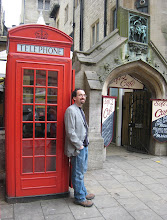For physicists, one of the most difficult, even treacherous, situations is the cocktail party. I do not say this because I think physicists lack conversational skills. That is a very ill-deserved stereotype: most physicists are actually quite personable and frequently very funny. Yes, perhaps some physicists are a bit unusual, perhaps some are not very fashionably dressed, and perhaps some lack Emily Post manners (these quirks are frequently to the dismay of their spouses or significant others). No, I say that cocktail parties are difficult because invariably someone asks “what do you do for a living” which puts the physicist in a difficult position. On the one hand, most physicists would love to start an hour long lecture on their chosen topic of devotion. Virtually every physicist absolutely loves their work, or they would not have chosen the rather difficult road to being a physicist. But the unsuspecting cocktail party guest does not really expect, and rarely wants, to hear an hour long lecture on the beauty of spontaneous symmetry breaking, the renormalization group, or the like. And nothing is more painful to the physicist than trying to reduce some mind-blowing concept to a single one sentence answer. Wouldn’t James Joyce cringe to be forced to summarize his Ulysses to one sentence, perhaps as “the story of a guy having a day that feels pretty long.”? But nor would you want Joyce to give you the whole story over a gin and tonic.
I have still not come up with a perfect strategy for handling this type of situation. Usually I resist giving more than one word answers until I am convinced that the person who asked the question really wants to hear the extended remix for the answer, in which case, once pushed, I can talk incessantly. I remember once launching into an hour-long rant about what a travesty it is that the common educated person does not know who the physicist John Bardeen is, the same way that people know who Watson and Crick are (for those of you who don’t know, maybe I’ll write a blog entry about Bardeen soon). Another time I raged about why nonpertubative physics is the fundamental problem that all theoretical physicists need to wrestle with for the next century. I’m not sure how well these, or any other of my spontaneous cocktail party lectures, were received, but I think that having an audience who had already had a few cocktails might have helped.
The reason this all comes to mind is because of what transpired over my Thanksgiving holiday last month. As in previous years, I went up to Rochester NY to visit my family. During the traditional Thanksgiving feast, we each tried to explain to the youngsters at the table – my niece Seneca (almost 4.5 years old) and my nephew Milo (2.3 years old) – what we did for a living. Well, trying to explain to a five year old what a physicist does is a tough task, and as usual I tried to squirm out of it. But rightly pushed by their mom (“you have to give them a good answer so they can grow up to be scientists too”, which, incidentally, I would very much like to see) I struggled to come up with something short and sweet and simple. My quick answer was
“A physicist is someone who tries to figure out why things work the way they do… like why something falls when you drop it”
But I was not completely happy with this as an answer. On the other hand, even after some thinking, I still have yet to come up with a better response. If any of the physicists (or non-physicists) out there want to give a shot at one sentence that summarizes what a physicist does, suitable for five year olds and perhaps cocktail parties, please post in the comments section or email it to me directly. With luck at next Thanksgiving I will be able to start the process of turning my niece and nephew into future physicists (although perhaps they might want to focus on kindergarten first).
Subscribe to:
Post Comments (Atom)

No comments:
Post a Comment